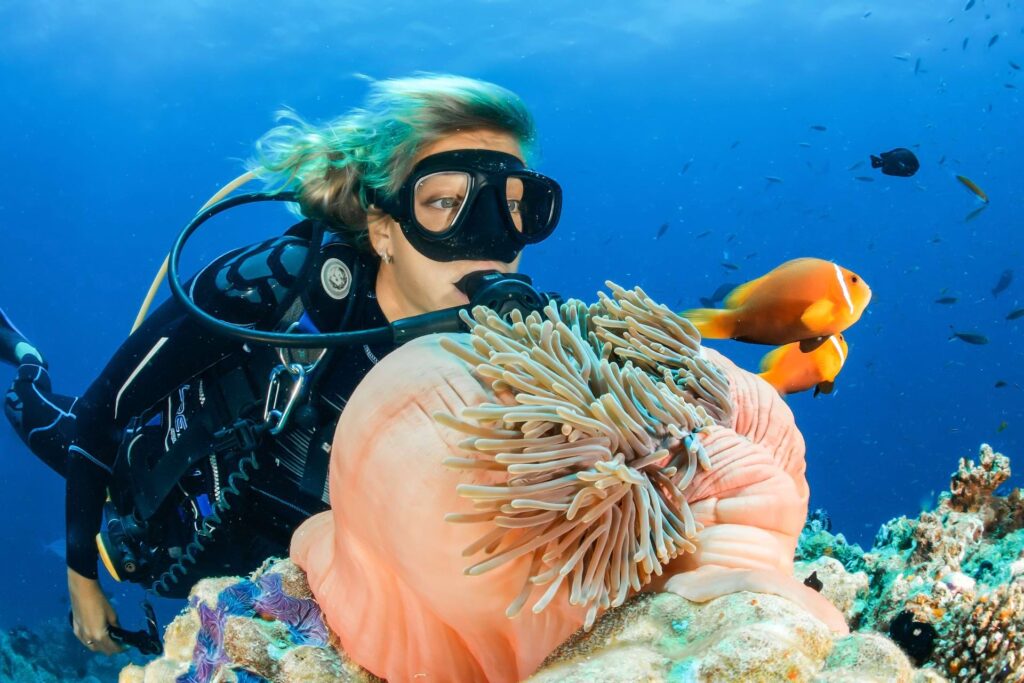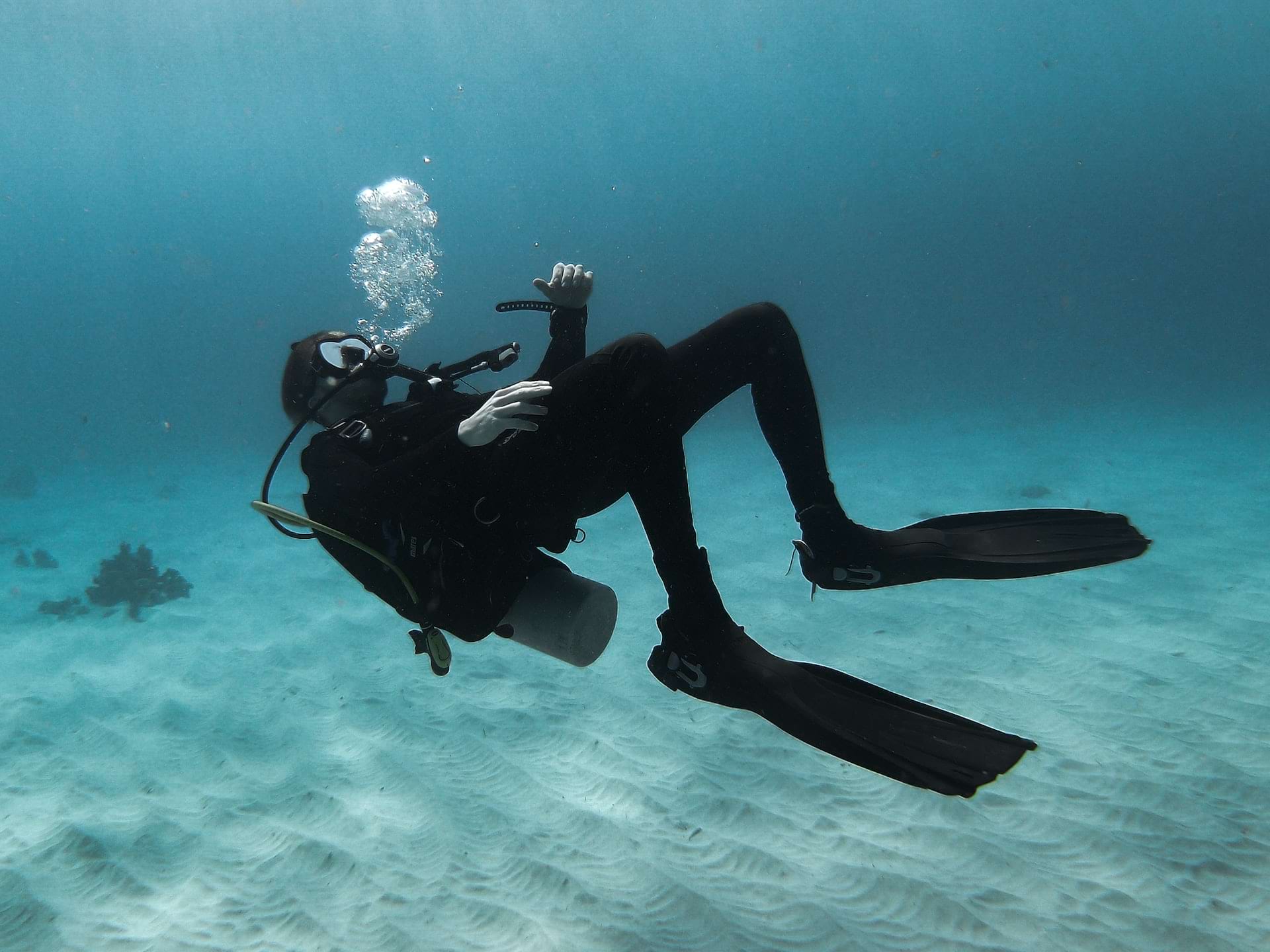If you’ve ever thought about trying scuba diving, you might be wondering if it’s worth the cost.
Although you can give it a try without certification, there are many more barriers if you’re not certified. So, is the scuba diver certification cost worth it? And what do you get for your money?
Read on to learn what’s included in a scuba diving certification course and how much it’ll cost you – you might be pleasantly surprised.
Looking for the best places to go scuba diving? You can’t beat Tulum, Mexico! Here’s a full area and diving guide to find out more.
Why Get Certified?
Technically, you don’t have to hold a certification to go scuba diving. So, what’s the point of getting certified? Here are some benefits.
Rental Barriers
Many scuba diving rental shops won’t rent out equipment to people without a scuba certification. This is for safety reasons and helps limit accidents from happening with anyone who isn’t experienced in diving.
Although it’s not illegal to scuba dive without a certification, taking a course will give you all the safety knowledge and skills you need to dive safely, and it will make it much easier to rent out gear on your trips.
Safety
Scuba diving is a skill that takes practice. Taking a certification course will teach you all the hand signals, safety precautions, and proper ways to use the gear. You’ll also get to do shallow, safe dives with a certified instructor, so you know you’re safe.
Although scuba diving is easy when you know how to do it safely, a lot can go wrong if you’re not sure what you’re doing. Having the right knowledge when you’re in the open water can be the difference between life and death, so certification is a must.
Knowledge of equipment
You won’t be able to figure out how to use scuba gear without the help of an expert. It takes some time to learn how to operate oxygen tanks and face masks, and what to do if something goes wrong while underwater.
During certification, you’ll learn all there is to know about your scuba gear and how to use it properly. Since you’ll be learning from a certified expert, you’ll be much more confident that you know what you’re doing when it’s time to dive.
The Cost Of Certification

Scuba diving certification costs vary depending on the location and school you use. We’ll take a look at the different agencies later, but the most affordable location for getting scuba certified is Asia.
During the winter in Asia, scuba schools are packed with beginners looking to get certified for an affordable price. Of course, you’ll need to factor in the cost of getting to Asia in your research.
There are also variations in prices across agencies. Here are a couple of the most popular agencies and the averages prices you can expect to pay:
- PADI: $300 – $700
- NAUI: $300 – $1,000
- SDI: $250 – $800
- SSI: $300 – $600
Each agency has scuba schools throughout the world, so do your research when choosing the right one for you. In general, schools in the US tend to be more expensive than in other countries.
What’s Included In the Scuba Diver Certification Cost?

It might seem expensive to get your scuba diving license, but there is a lot included in the price. For an Open Water Diver Course, here is what you can expect.
Knowledge development
Every course has a theoretical element that involves learning through books and videos before you get in the water.
Some of the schools provide this through e-learning, which means you can start your scuba certification from home. However, others also offer classroom sessions where you’ll have access to a certified teacher for help.
Once you’re confident in the theory, you’ll take a multiple choice exam to show you have the knowledge needed to safely transition into the water.
Don’t worry if you don’t pass the first time – your instructor will help you revise so you can take the test again.
Confined water training
Next up is confined water training. Here, you’ll learn all the basic skills of diving in the safety of a pool session. You’ll get to use all the diving equipment and earn to breathe underwater without the risks associated with open water.
Most of the time, this will take place in a swimming pool, but some areas have dedicated spaces set up in other bodies of water.
Open water training
Once you’ve completed your confined water dive and pool training, your instructor will take you out into open water. Your first dive will be one to remember, and you’ll never forget the feeling of entering an underwater world.
Agencies will take you four or five open water dives over several days, so you can practice all the skills you learned in confined water. You’re only allowed down to a depth of 12 meters, but this isn’t mandatory if you’re feeling unsure.
Once you’ve proved you are confident to complete an open water dive, your instructor will award you with your scuba certification!
You’ll get an open water certification card that you can show a dive shop in order to rent gear and go out diving without an instructor – but we still always recommend using the buddy system.
Scuba Diving Agencies
We’ve already talked about the cost of scuba diving lessons at the different agencies, but let’s look at the differences between the major schools, so you can decide which one is right for you.
There are tons of scuba diving schools around the world, but the top agencies are:
- Professional Association of Dive Instructors (PADI)
- National Association of Underwater Instructors (NAUI)
- Scuba Divers International (SDI)
- Scuba Schools International (SSI)
Professional Association of Dive Instructors (PADI)
This is the largest agency in the world and has diving schools in 186 countries worldwide. The PADI dive center has its own system for teaching scuba diving with easy learning materials that are accessible to all.
Prices vary depending on the country, but this is one of the mid-tier schools when it comes to price.
NAUI – National Association of Underwater Instructors
The NAUI is the oldest scuba diving agency in the world, established in 1959. This is also a non-profit agency and is the chosen school for many colleges and universities; even the US Navy and NASA use the NAUI.
Depending on where in the world you are, the NAUI is one of the more expensive agencies, but it has a great reputation and in-depth scuba diving course to show for it.
SDI – Scuba Divers International
The SDI is the recreational side of Techincal Diving International, which provides technical diving training – their diving instructors even helped out on the new Avatar: The Way of Water movie. There are over 2,200 schools worldwide that offer SDI training, with a unique course on offer.
All students taking the course must have modern dive computers and use them from day one. Some don’t like the use of a computer, since they have the potential to fail. But it is an easy way of dive planning.
SSI – Scuba Schools International
SSI has been around since 1970 and has agencies in 110 countries. All of the training at SSI takes place through their worldwide centers, but trainers are given freedom on how to present the materials to students.
Out of the agencies, this is one of the most affordable ones, depending on where you train in the world.
Minimum Requirements For Scuba Diving Certification
Scuba diving is an exclusive sport that almost anyone can enjoy. But there are still a few minimum requirements you need to meet if you want to become certified.
Minimum Age
Usually, you need to be at least ten years old to take your scuba diving certification, but this does vary by training agency. Younger divers can get their junior-level certification but will have shallower depth limits.
Medical History
You’ll need to complete a medical form before you can take your open water certification. This ensures you’re generally in good health and have no medical conditions that could make it unsafe for you to dive.
If you do have any pre-existing medical conditions, you’ll need to clear this with a doctor and provide a note saying they are happy for you to dive.
It might be tempting to lie and not disclose any health conditions, but this is in place for your safety. And if something went wrong while you were diving, you probably wouldn’t be covered by insurance.
Water skills
You’ll also need to participate in a short water skills test to show you’re competent in the water. This usually involves swimming 200 meters unaided, or 300 meters with a mask and fins. You’ll also need to tread water for around ten minutes.
You can still learn to scuba dive as a non-swimmer, but you’ll need to take an introductory class and maybe a swimming lesson before you can go on to do a certification course.
How Long Does It Take To Get Scuba Certified
Most Open Water Qualifications take three or four days. Over those days, you’ll do the theoretical study, confined training, and open water dives. In open water, you’ll usually take part in four to five dives, depending on the agency.
You may need longer to ace the theory or become confident enough to go to open water, so the course could take longer.
How To Save Money On Certification
If you’d love to become a certified scuba diver but can’t afford the course, you can save money by looking at schools in different parts of the world. In the US, it costs between $500 and $1000 to get certified, whereas it’s more affordable elsewhere.
Koh Tao is a small island off the coast of Thailand and is known as one of the cheapest places to get scuba certified. It has over 60 diving centers and costs around $350 to get a certification.
Once you are certified, it’s also incredibly cheap to go on a diving trip around the island. Of course, don’t forget to factor in the cost of your flights and hotel if you plan on traveling to get certified.
What Can You Do With An Open Water Diver Certification?
Once you have your Open Water Diver certification, you’re free to dive recreationally on your own, without a certified dive instructor.
There are thousands of places around the world-renowned for diving, so the options are endless.
You’ll get a card, so it’s also easier to rent gear in different resorts. Plus, you’ll be able to get involved in the diving community, where you can make new diver friends and get some tips for the best locations.
Prepare for Your First Dive
Getting certified to dive is easy, and it opens up a whole new world for you to explore. Once you’re covered the scuba diver certification cost, it’s time to start planning your trips!
If you plan on diving regularly, you might want to invest in your own gear. This ensures the best fit and means you can be confident in the quality of the brand. At the very least, we recommend buying your own wetsuit instead of renting one.
Head to the next guide in our scuba diving series to find out what you should wear under your wetsuit – divers rash is real, and you’ll want to avoid it!

